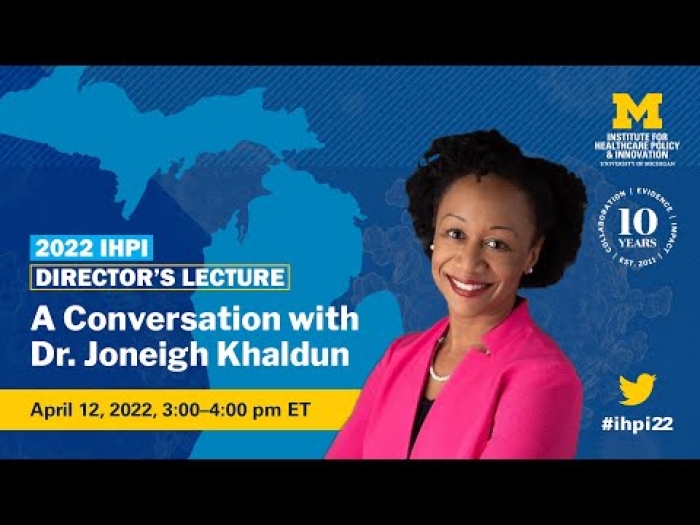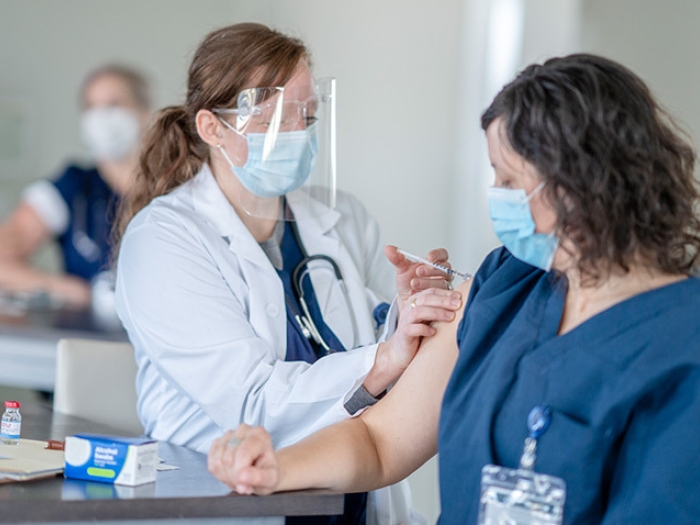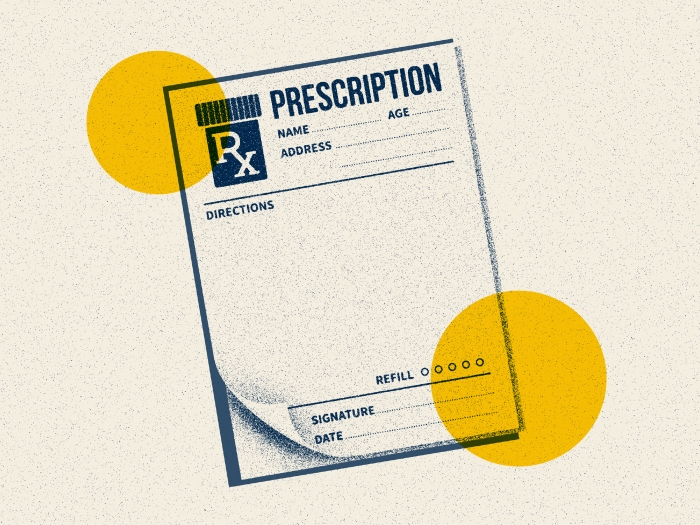From variants and vaccines to what lies ahead, CNN medical correspondent and University of Michigan alum shares insights.
5:00 AM
Author |
After more than a year of covering the coronavirus pandemic in-depth, Sanjay Gupta, M.D., still feels like every day is a sprint.
But he takes the media's role as an "honest broker" in the public's understanding of COVID-19, very seriously, from the evolving knowledge about the virus and how to prevent transmission, to treatment and the uptake of vaccination.
He also notes the key role of experts who are willing to engage with reporters, or communicate directly to the public through social media and their own writing.
These topics, and much more, came up in the hour-long discussion with his longtime friend and fellow University of Michigan alumnus Preeti Malani, M.D. – also a trained journalist and physician – on May 6, 2021.
MORE FROM THE LAB: Subscribe to our weekly newsletter
The talk, hosted by the U-M Institute for Healthcare Policy and Innovation, served as the 2021 IHPI Director's Lecture, and was introduced by IHPI director John Z. Ayanian, M.D., M.P.P.
Gupta addressed a number of questions submitted by audience members, and even reflected on his family, and his time in Ann Arbor, where he received his undergraduate and medical education, and his neurosurgery training.
Watch the full recording above, or click the links to skip to specific sections and questions:
-
Reflecting on his experience during the past 15 months, as a journalist and a physician. "For me personally, I since January of last year really felt like I've been sprinting, learning as much as I can about this virus…This became something that was almost an obsession in some ways, immersing myself fully in this."
-
What's been the most surprising thing about your experience covering the pandemic? "The thing that strikes me is that you can give people objective data about risk, and people will subjectively interpret that in different ways."
-
What role does an expert's presence on social media play? "It can be helpful. We're at an inflection point in terms of how people are gathering knowledge. It's important for us as a TV network to ensure the veracity of this to do our homework, but essentially these are people who are flagging to us 'I have this background, I'm raising a flag and putting it on social media.' And sometimes that certainly gets our attention."
-
What can both healthcare professionals and the media do to combat the rampant medical misinformation and distrust in science that's out there? "I do think that letting people in on the process becomes very helpful towards combatting misinformation." Gupta narrated and produced a CNN Film that will debut on May 15, called "Race for the Vaccine". He says that while past data has suggested that about 18 to 20% of the country will always be science skeptical, there's a large 'movable middle' that is open to taking new information into account when deciding on a health-related topic.
-
Even if you communicate evidence based messages well we still need to convince people to behave in ways that protect public health. How should we do that? "We have gotten to a point in our society where I do ask myself, 'who are the honest brokers in our society,'" who would be most trusted. In the past, he says, this might have been clergy, military, health care professionals. Today, "I think that journalists are pretty good honest brokers. It's not always perceived as such."
-
What value does positive reinforcement have, in particular for incentivizing vaccination? "Honesty has to be the most important ingredient – you don't want to sugar coat things or gloss over things – but I don't think it's a necessary thing to take away from hope. Presenting a problem with a plan." Gupta cites the example of Julian "Buzz" Hoff, chair of neurosurgery at Michigan for 25 years including during Gupta's time in training. "The vaccine – as much as we know it will save people's lives, an important part of that message is what do you get to do with that life. You want to couple it with positive messages like that."
-
Can you talk about the role that communication plays in informing the public effectively? Are we at a point where people have made a decision about vaccination and are going to stick with it? On this issue of vaccination, he says, it is the communication and interaction with their local health care teams that may make the difference. Malani agreed, citing data from the National Poll on Healthy Aging that she leads.
-
If you had 30 seconds to convince someone to get the COVD vaccine, what would you say?
-
How did your mom influence you and your brother's careers? Malani and Gupta discuss his path-breaking mother, an engineer who was profiled in Time magazine.
-
Students and health professionals would like advice on how they might venture into medical journalism. "There's a lot more desire for this kind of knowledge, certainly in times of pandemic and overall. For a long time the tendency was to select generalists with regard to the reporting but like medicine has become more specialized – infectious disease within health care. To start just write as much as you can, find what you're passionate about, if you're comfortable post stuff because it's a flag to people out there that you're willing to talk about it and you have an important message to share."
-
What are some of the things you've done this last year to keep yourself going? "I've really enjoyed being home with my family, just spending a lot of time together. There's nothing good about this pandemic but there's been some silver linings and that's one of them."
-
Reflecting on the situation in India. Gupta, who has extended family in New Delhi, recently disclosed that he had lost his uncle there to COVID-19. "For the most part this past year they thought 'We're being careful' and in March of this year they heard it was the 'end game' – and they took that to heart. Now they see what's unfolding in front of them and they're scared."
-
What will the role of media be in the next year, regarding COVID communication? "There has been a significant desire for COVID stories, knowledge, information via media. I think that will continue. I think going into the fall media will have an important role in terms of what happens as everyone goes back to school. We have not fully from a mental health standpoint fully processed what has just happened here. This is not normal, 600,000 people dying with a disease that we had not defined 15 months ago is not normal."
-
How can Americans advocate for distribution of vaccine to areas of the world that need them? "There is a very practical obligation. This pandemic has reminded us that outbreaks anywhere can be outbreaks everywhere. If India is continuing to have significant spread. that's a problem for the world. Some of the mutations may develop escape immunity from the vaccines and cause issues all over the world."
Like Podcasts? Add the Michigan Medicine News Break on iTunes, Google Podcast or anywhere you listen to podcasts.

Explore a variety of health care news & stories by visiting the Health Lab home page for more articles.

Department of Communication at Michigan Medicine
Want top health & research news weekly? Sign up for Health Lab’s newsletters today!





